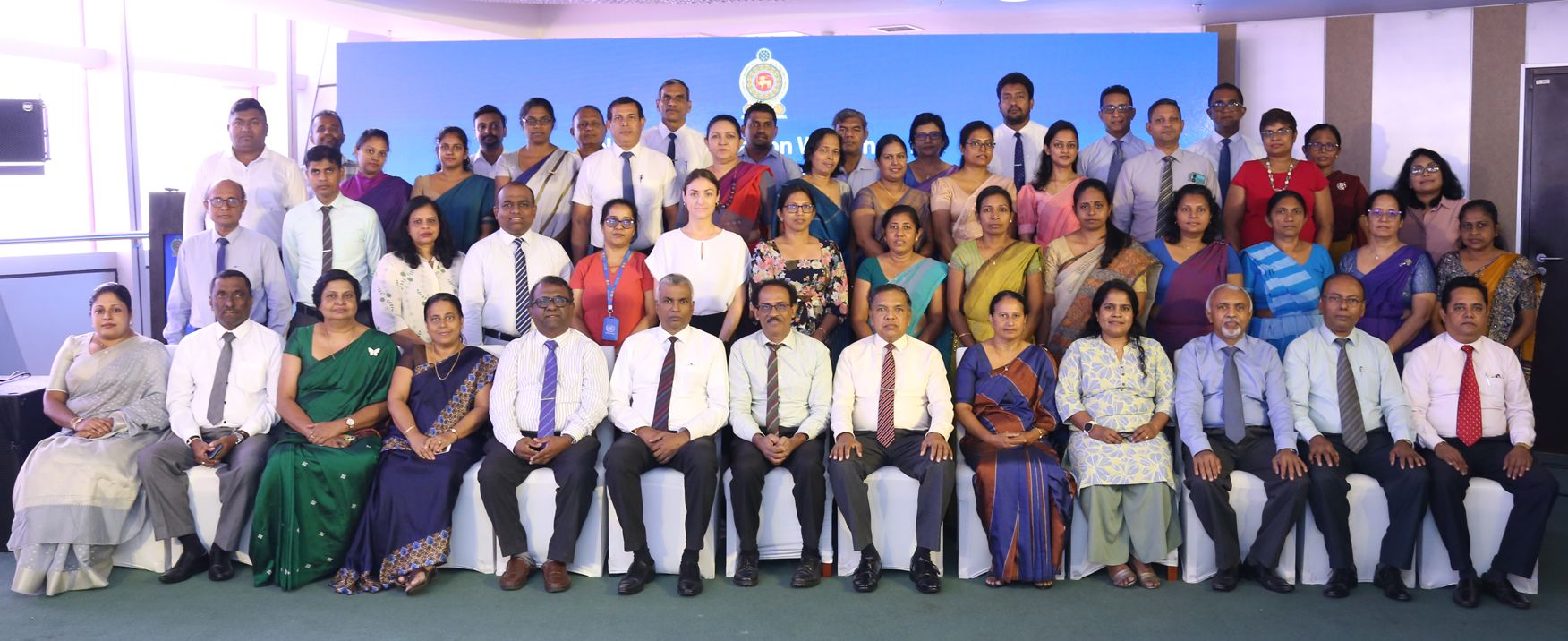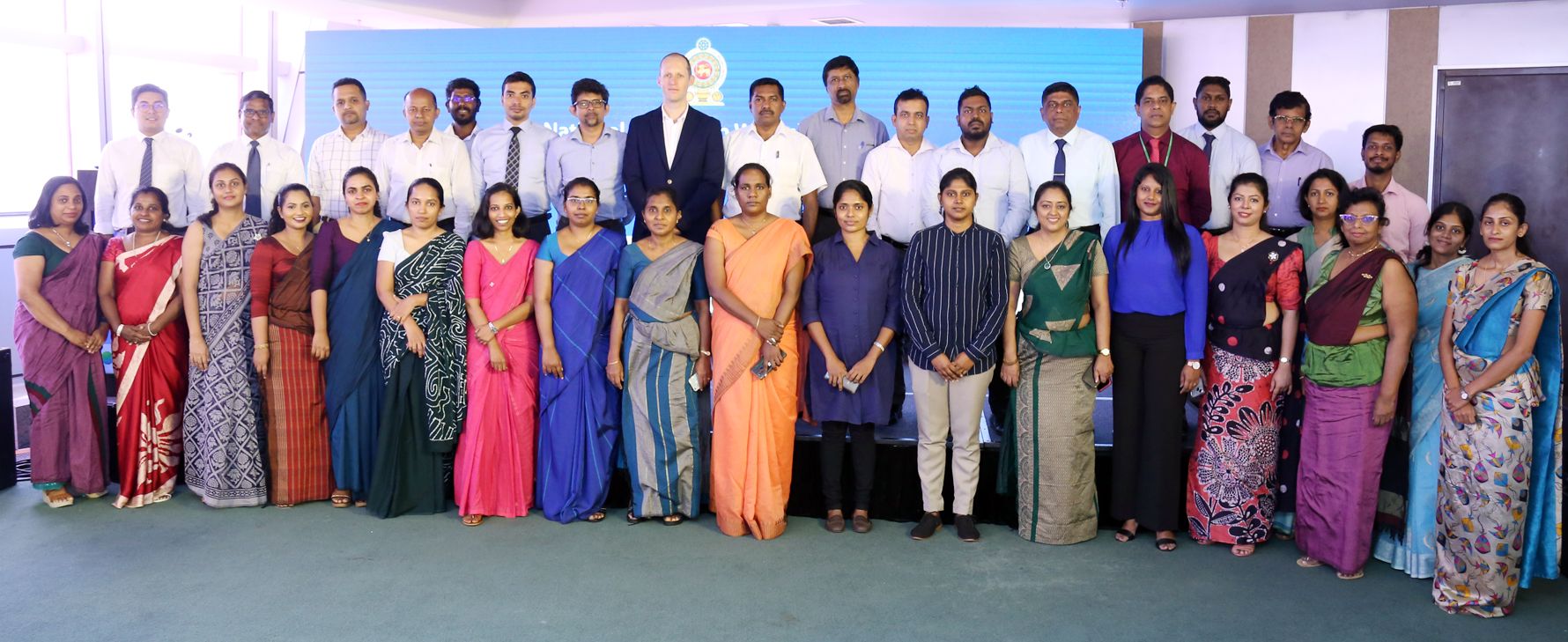
GWP SAS in their endeavour to support the Government of Sri Lanka to strengthen the water sector project pipeline has provided assistance in developing three water-related concept notes to be submitted to secure funds through the Green Climate Fund (GCF). The project ideas to be developed into GCF Concept Notes under this effort were i) Financing of adaptive transformation of vulnerable smallholder farming systems in Sri Lanka from subsistence to enterprising, ii) Climate resilience in the Sinharaja forest landscape and iii) Sri-Lanka Urban Resilience Project (SLURP).
The primary ojectives of this workshop thus were to enage national stakeholders to provide their final inputs to validate the three GCF concept notes, to further discuss and define implementation arrangements and other areas of the concept notes and lastly, to clarify and agree on the way forward for GCF concept note finalisation.
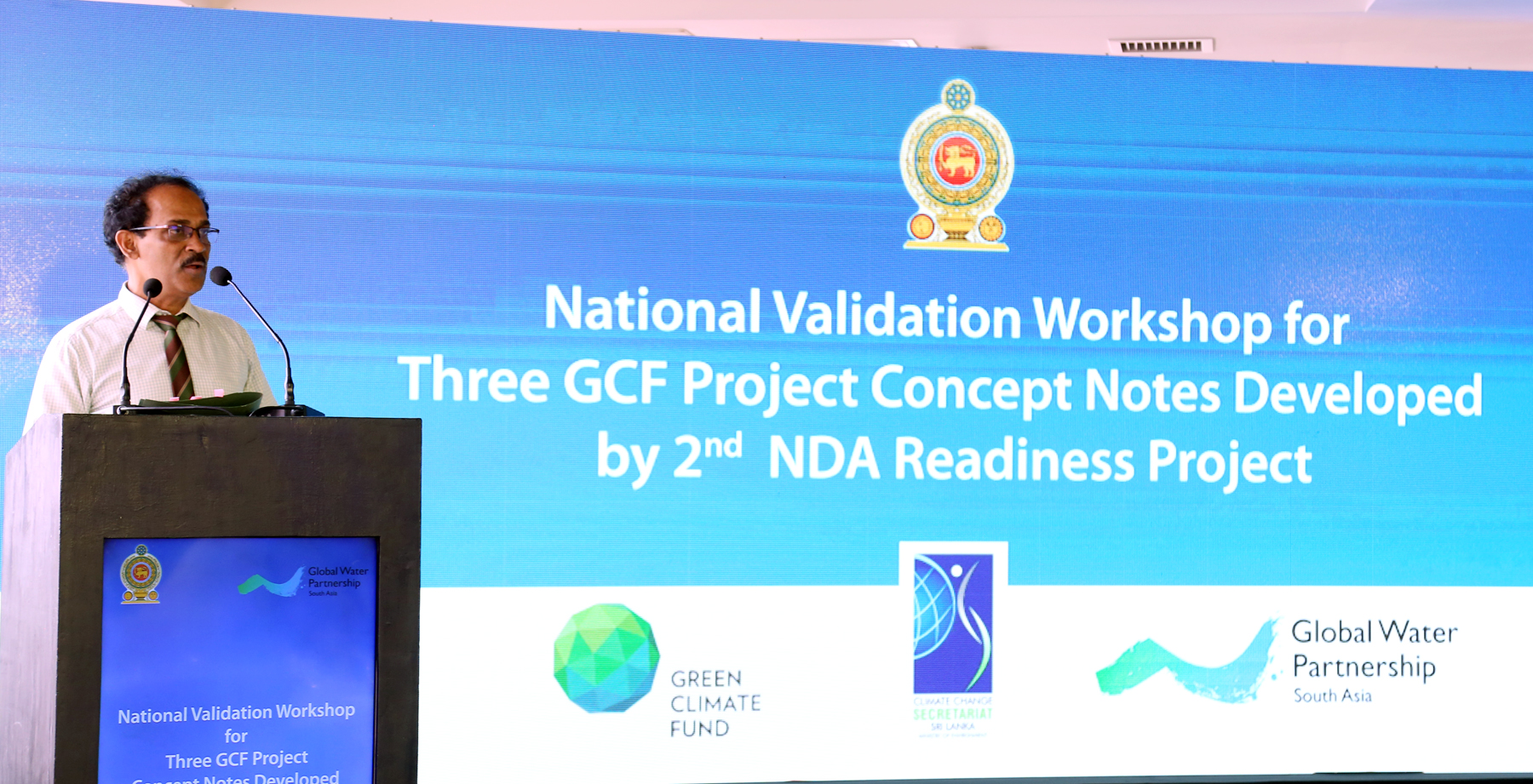 The participants were welcomed by Mr Leel Randeni, the Director of the Climate Change Secretariat, on behalf of Mr R. D. S. Jayathunga, Additional Secretary (Environment Development), of the Ministry of Environment, Sri Lanka. He referred the validation workshop that is being held on the day is an important milestone for the project. He further emphasised that Sri Lanka is one of the most vulnerable nations when it comes to climate change issues. The nation suffers with extreme floods, droughts, rise of the sea level, erosion of the coastal belt and saltwater intrusion among other economic and social hazards. To put the severity into perspective, he reminded the audience that Sri Lanka was among the top five vulnerable countries of the climate risk index in 2017/18. Finally, he concluded his speech by briefly introducing the three concept notes that would be presented and discussed during the course of the day.
The participants were welcomed by Mr Leel Randeni, the Director of the Climate Change Secretariat, on behalf of Mr R. D. S. Jayathunga, Additional Secretary (Environment Development), of the Ministry of Environment, Sri Lanka. He referred the validation workshop that is being held on the day is an important milestone for the project. He further emphasised that Sri Lanka is one of the most vulnerable nations when it comes to climate change issues. The nation suffers with extreme floods, droughts, rise of the sea level, erosion of the coastal belt and saltwater intrusion among other economic and social hazards. To put the severity into perspective, he reminded the audience that Sri Lanka was among the top five vulnerable countries of the climate risk index in 2017/18. Finally, he concluded his speech by briefly introducing the three concept notes that would be presented and discussed during the course of the day.
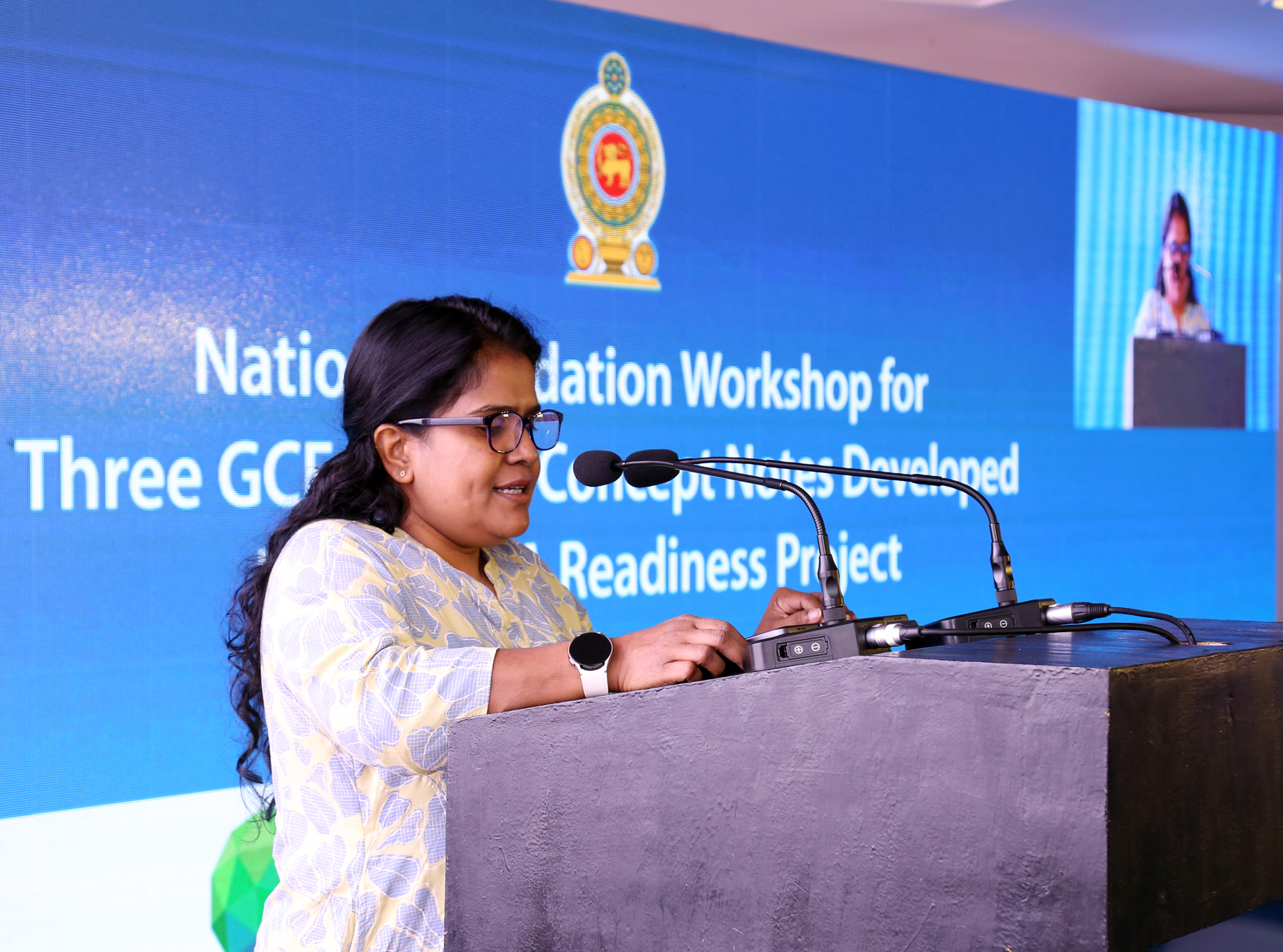 Soon afterwards, Ms Diluka Piyasena, the Interim Regional Coordinator of GWP SAS, provided the opening remarks. She communicated that the GWP is the delivery partner of the 2nd Readiness Project 2021 and cited that it was observed that the development of GCF project pipeline for Sri Lanka has just begun and has limited bankable concept notes to develop into full proposals. She explained that in response to this, the 2nd Readiness Project supports the National Designated Authority (NDA) to develop three concept notes that need to be validated, finalised and ready to be submitted to the GCF. Therefore, she requested to those who attended the workshop to provide their valuable feedback and comments to further improve, validate and finalise the three draft concept notes. Moreover, she provided a brief introduction to both the GWP and GWP SAS and claimed that the GWP’s expectation as a delivery partner is to produce strong and deep-rooted action plans aligned with the needs and demands of the country’s stakeholders. She concluded her speech wishing everyone a fruitful workshop.
Soon afterwards, Ms Diluka Piyasena, the Interim Regional Coordinator of GWP SAS, provided the opening remarks. She communicated that the GWP is the delivery partner of the 2nd Readiness Project 2021 and cited that it was observed that the development of GCF project pipeline for Sri Lanka has just begun and has limited bankable concept notes to develop into full proposals. She explained that in response to this, the 2nd Readiness Project supports the National Designated Authority (NDA) to develop three concept notes that need to be validated, finalised and ready to be submitted to the GCF. Therefore, she requested to those who attended the workshop to provide their valuable feedback and comments to further improve, validate and finalise the three draft concept notes. Moreover, she provided a brief introduction to both the GWP and GWP SAS and claimed that the GWP’s expectation as a delivery partner is to produce strong and deep-rooted action plans aligned with the needs and demands of the country’s stakeholders. She concluded her speech wishing everyone a fruitful workshop.
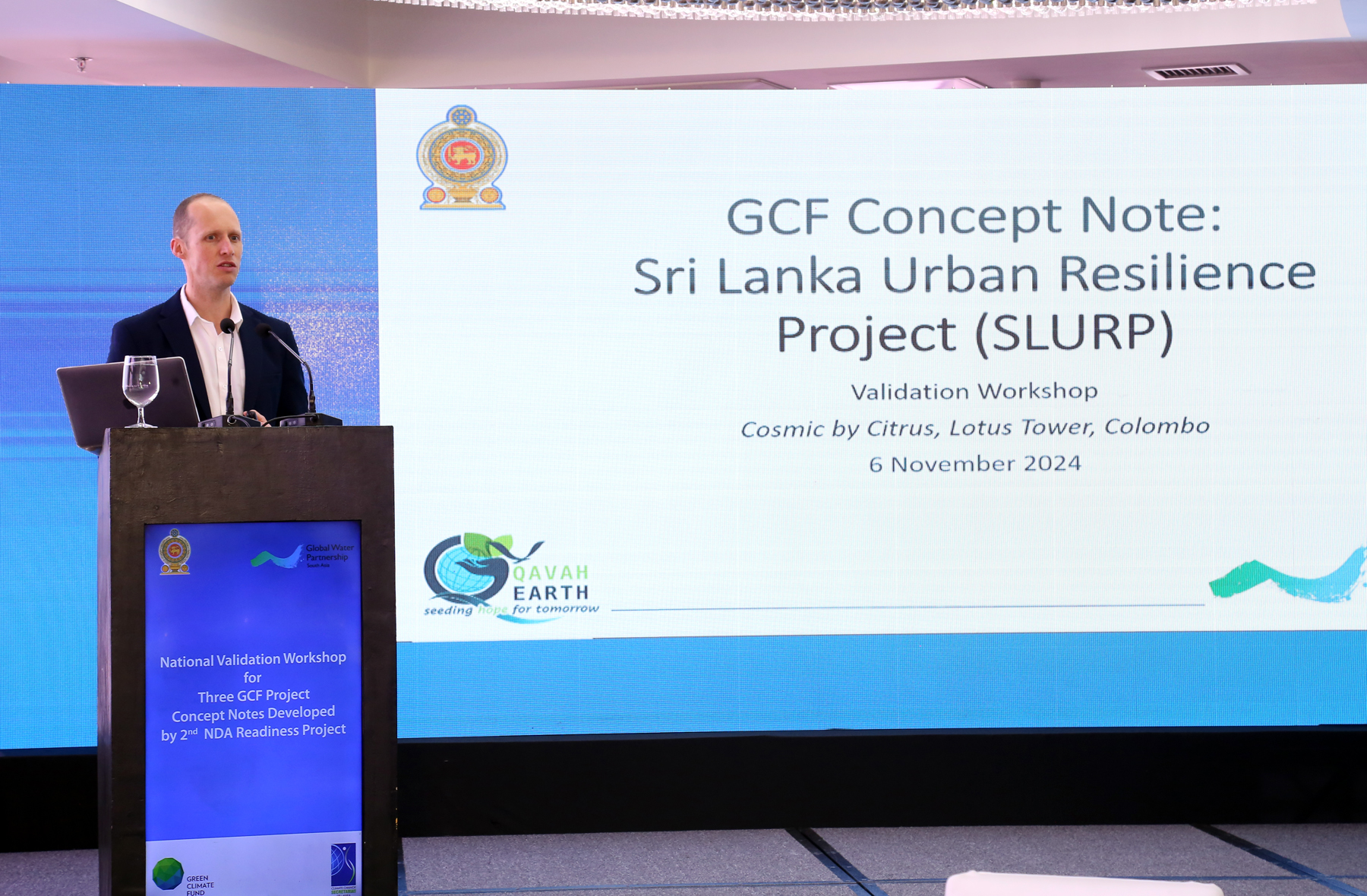 Next, an overview of the Concept Note Development Process was conducted by Mr Kevin Emslie, Director of Qavah Earth which was hired by GWPO for developing three bankable concept notes for Sri Lanka aligned with GCF’s requirements and GWP’s vision. In his presentation he touched upon the process that has brought the GWP to the concept note validation stage while explaining where it will have move on from here once these concept notes are being validated. Further, after shedding light on the workshop’s objectives and agenda, he detailed the project idea prioritisation process and concept note development process going over the time period within which each transpired the key events that took place in their interim. This was promptly followed by a breakdown of Sri Lanka’s climate analysis and a Gender and Social Inclusion (GESI) analysis. He then described the safeguards screening where he communicated the potential environmental and social risks of these projects. Moving on he elaborated on the scoping-phase which is an economic and financial analysis aimed at providing a strong economic and financial argument for the project looking at cost effectiveness and cost benefits of the potential investments. He concluded his presentation by providing an overlook at several pre-feasibility studies and taking the audience through how to identify potential GCF accredited entities to take concept notes forward.
Next, an overview of the Concept Note Development Process was conducted by Mr Kevin Emslie, Director of Qavah Earth which was hired by GWPO for developing three bankable concept notes for Sri Lanka aligned with GCF’s requirements and GWP’s vision. In his presentation he touched upon the process that has brought the GWP to the concept note validation stage while explaining where it will have move on from here once these concept notes are being validated. Further, after shedding light on the workshop’s objectives and agenda, he detailed the project idea prioritisation process and concept note development process going over the time period within which each transpired the key events that took place in their interim. This was promptly followed by a breakdown of Sri Lanka’s climate analysis and a Gender and Social Inclusion (GESI) analysis. He then described the safeguards screening where he communicated the potential environmental and social risks of these projects. Moving on he elaborated on the scoping-phase which is an economic and financial analysis aimed at providing a strong economic and financial argument for the project looking at cost effectiveness and cost benefits of the potential investments. He concluded his presentation by providing an overlook at several pre-feasibility studies and taking the audience through how to identify potential GCF accredited entities to take concept notes forward.
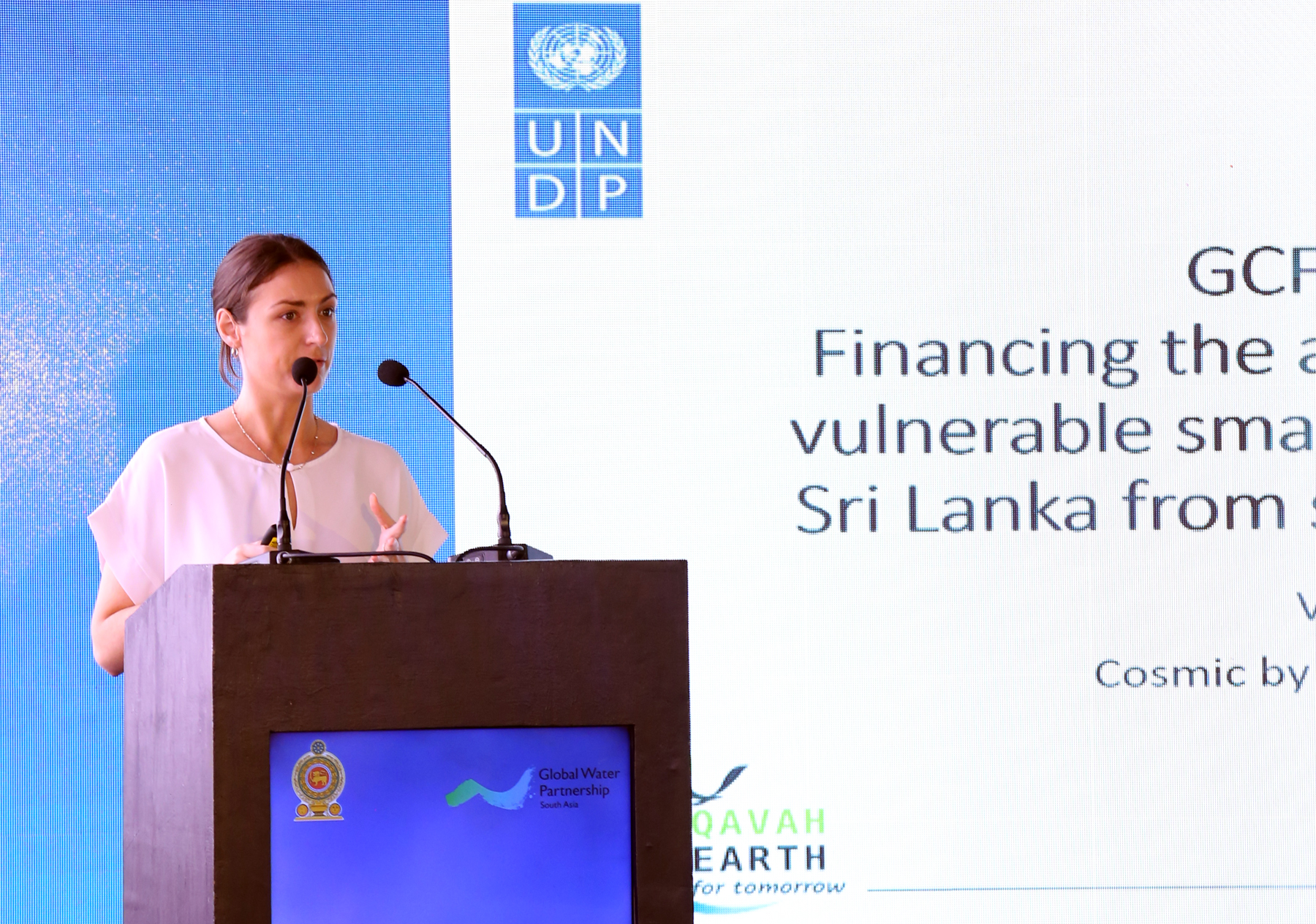 Following the tea break, the next segment of the workshop focused on presenting and discussing the 3 concept notes spearheaded by key personnel from Qavah Earth. The concept notes concerning the ‘Financing of adaptive transformation of vulnerable smallholder farming systems in Sri Lanka from subsistence to enterprising GCF’ was conducted by Ms Sarah Catto. The concept notes relating to ‘climate resilience in the Sinharaja forest landscape’ and ‘Sri-Lanka Urban Resilience Project (SLURP)’ were conducted by Mr Emslie. Each of them consisted of a presentation, where a basic overview was given including the problem statement, barriers, project goal(s), expected outcomes and potential impact, followed by an interactive question and answer session.
Following the tea break, the next segment of the workshop focused on presenting and discussing the 3 concept notes spearheaded by key personnel from Qavah Earth. The concept notes concerning the ‘Financing of adaptive transformation of vulnerable smallholder farming systems in Sri Lanka from subsistence to enterprising GCF’ was conducted by Ms Sarah Catto. The concept notes relating to ‘climate resilience in the Sinharaja forest landscape’ and ‘Sri-Lanka Urban Resilience Project (SLURP)’ were conducted by Mr Emslie. Each of them consisted of a presentation, where a basic overview was given including the problem statement, barriers, project goal(s), expected outcomes and potential impact, followed by an interactive question and answer session.
Mr Gamini Jayasinghe, Policy Expert of the 2nd Readiness Project, concluded the workshop’s proceedings by delivering vote of thanks. He expressed his sincere gratitude to all those who have been part of the journey so far and thanked everyone who offered their support. He also thanked the participants who joined to help validate the concept notes noting that their time, expertise and feedback has offered them both “depth and direction”. Looking forward, he claimed that the priority will be to incorporate insights gathered during the day and finalise the concept notes which will lead into the next phase where GWP SAS engage with accredited DAEs and development partners to secure the necessary resources and setting in motion a structured plan to for building the concept notes to full proposals. He reaffirmed the commitment to collaborative efforts moving forward in order to ensure that the projects serve their intended purpose and benefit all involved stakeholders. He concluded his speech by saying that he looks forward to continuing collaboration and to turning these concepts into reality and seeing the results of shared efforts in due time.
